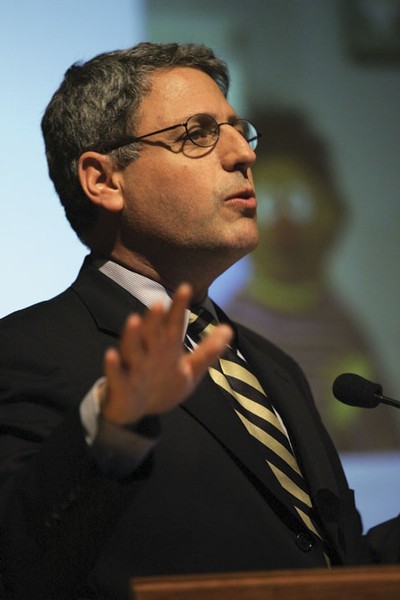
Muppets spread understanding around world (Photo by John Schreiber, The Daily Campus)
Students got a chance to reconnect with their childhoods and stroll down a familiar street at a lecture in the Meadows School of the Arts’ Caruth Auditorium Wednesday night.
Gary E. Knell, president and CEO of Sesame Workshop, the nonprofit company that produces the children’s educational show, “Sesame Street,” was the featured speaker at the ExxonMobil Lecture on Ethics in Advertising.
The speech was entitled, “Muppet Diplomacy: How ‘Sesame Street’ is Working to Change our World,” and Knell spoke about the work Sesame Workshop does to educate children around the world.
Knell said Sesame Workshop is changing the way children learn and how people relate to each other.
Knell began with a short history of “Sesame Street,” the hit show that started in 1969 and has taught three generations of preschool children, and how Sesame Workshop has taken this experience and spread the show’s concept to 120 different countries in the world.
“Sesame Street’s” growth and expansion is very similar to rap music, Knell said.
The show was originally created for preschool children in inner city and underprivileged areas but saw a growth in popularity and financial support with children in suburban areas.
The show is so successful because it combines the work of pyschologists and developmental behaviorists with advertising strategies like jingles and parodies to reach out and relate to children.
Knell said that the formula for success for the various incarnations of the show is a “Whole Child Curriculum,” that is tailor-made for children in different cultures.
In addition to teaching children how to read and count, Knell said Sesame Workshop is helping children in different cultures tackle tough issues like racial and gender tensions as well as helping promote respect and understanding in areas of conflict.
One example is “Sesame Stories,” a series of episodes that help build a common bond between children in Israel, Palestine and Jordan by doing segments that focus on similarities between cultures in order to build self-respect and empathy, Knell said.
Knell showed clips of various shows, including a scene from the South African version, “Takalani Sesame,” which has a character who is HIV positive.
Knell said the HIV/AIDS epidemic is so severe in Africa that issues of discrimination and prejudice have to be tackled at an early age in order to teach children compassion before they are taught otherwise.
Studies have shown children as early as age 3 begin to pick up on racial tensions and prejudices of adults.
In more developed countries, like Japan and Mexico, Sesame Workshop takes on issues of basic and primary education and the environment.
Knell said that part of the success of the show is in the characters themselves. By using the power of the characters, they are able to sell merchandise to help fund the operation, as well as create other marketing opportunities for the various projects that Sesame Workshop presents.
Stateside, Sesame Workshop has developed a segment called “Global Grover,” where the loveable blue Muppet introduces American children to other cultures and customs.
Knell called the segment “a window to the world,” and said it helps children understand other children in other cultures.
When the show is started in other countries, Sesame Workshop takes great measures to ensure that respect is shown for the culture and practices of the country.
Knell said the challenges of tackling tough issues vary from country to country, but for Sesame Workshop to be successful, they can’t push “Sesame Street” as a show, but rather as an educational tool.
At the end of Knell’s speech, Grover of “Sesame Street,” met with the audience for pictures at a dessert reception with Knell.








